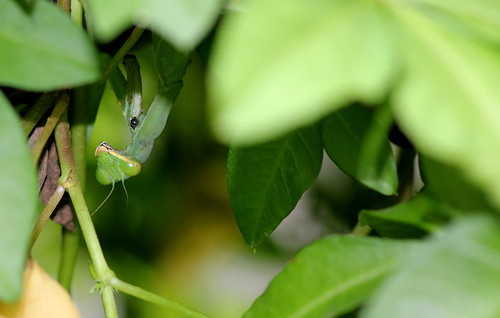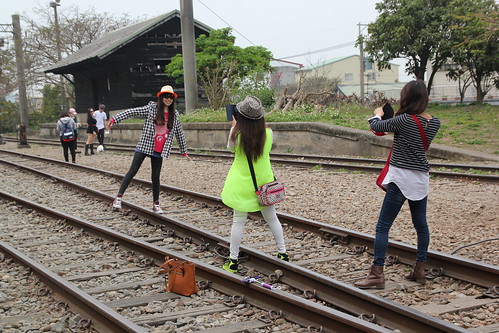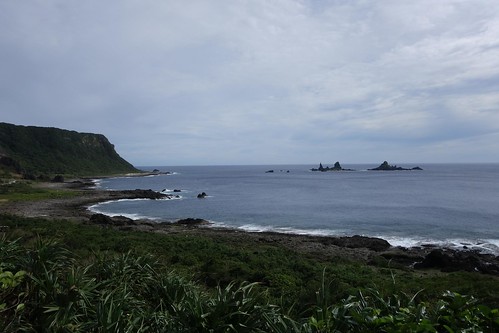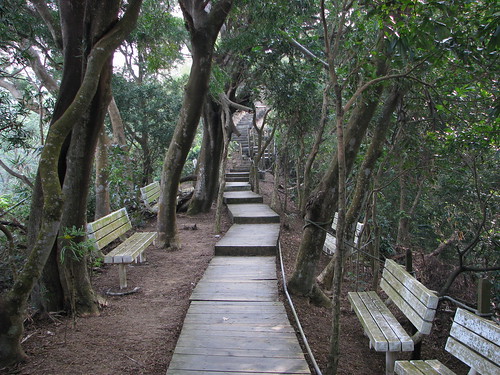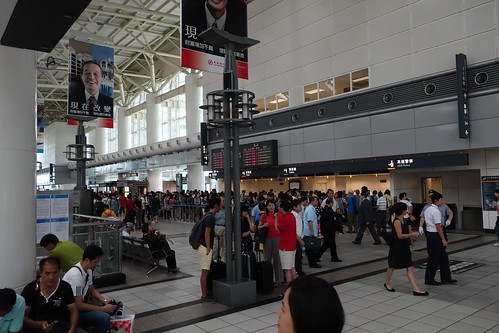Needed a Lanyu pic to stay calm for this blogpost.
Wow.
Talk about failure. BBC produces a comprehensive failure of the kind rarely seen, at once totally incompetent and completely unethical. Those of you who wonder why I always say BBC is institutionally pro-China, need look no further. I thought we might expect this kind of thing when the UK became a Chinese State-Owned Enterprise... So brace for an all-points fisk, dear reader. Gonna be a long one...
Let's start with the slanted title:
What's behind the China-Taiwan divide?
There is no "divide" between China and Taiwan. The divide is between the CCP and KMT. BBC is neutral; it roots for both parties against the people of Taiwan. The real divide is between the two Leninist, authoritarian Chinese expansionist parties that want to annex Taiwan to China, and the people of Taiwan, the vast majority of whom want independence. Wouldn't
What's behind the China-Taiwan Issue? have been a more balanced and less assumptive title?
Note one notable improvement in the last couple of years (
discussed in a post below) in the photo caption:
China sees Taiwan as a break-away province that will eventually be part of the country again, but many Taiwanese want a separate nation.
...not quite up to the real situation in which the majority of Taiwanese want an independent nation, but much better than a decade ago when the Taiwanese weren't even mentioned. Possibly in another decade the media will start saying most Taiwanese want an independent state. Except for BBC, of course.
The next set of commentary is hilariously obvious and desperate in its attempt to link Taiwan to China. If so much weren't at stake, this obsequious service to Beijing would be comical...
The first known settlers in Taiwan are thought to have come from modern day southern China.
The island first appears in Chinese records in AD239, when China sent an expeditionary force to explore - a fact Beijing uses to back its territorial claim.
After a brief spell as a Dutch colony (1642-1661) Taiwan was unquestionably administered by China's Qing dynasty from 1683 to 1895.
Note first what's not here -- "aborigines". Taiwan's indigenous people are simply gone from this discussion. A huge omission, for an obvious reason: the aborigines have a claim that predates Han settlement. Observe that BBC refers to "the first known
settlers" not
people or
humans, as if to deliberately mislead the reader into thinking they were Han settlers like those of a later era. Note also that no time is given -- had the BBC specifically mentioned the date, the reader would immediately realize that the "settlers" could not have been Chinese.
The reality is that they were Austronesian people, not Han, and archaeology is demonstrating more and more that they came up from the south (see chapter 1 of Bill Hayton's
The South China Sea for a review). The argument that they diffused out of what is now southern China is deliberately cultivated by pro-China types to help Beijing's expansionism in East and Southeast Asia. As Hayton notes, the ancient rice grains found in Taiwan are actually strains from India and Java. They were supplanted by strains from China much later. The first people in Taiwan most likely came up from the south, not from China.
"First appears in Chinese records in "239" (recall that by then Taiwan had hosted complex aboriginal societies for thousands of years). Far from being a fact, it is only a guess that references to Yizhou (
夷洲) in the third century and Liuqiu in the ancient literature may refer to Taiwan, there's no evidence to suggest it. There's
an excellent post on Forumosa that explains, with proper references, how stupid this claim is.
And why should anyone care when the island first appears in Chinese records? Unless you want to create the idea that Taiwan exists only in a Chinese context...
ERROR: Anyone could find from Wiki that the Dutch period in Taiwan began in 1624. Idiots.
I especially love the "
unquestionably" in that third paragraph above. It's like a flare warning that this piece was written from a pro-China perspective. Who else but a Chinese expansionist would insist on "unquestionably"? Is that balanced commentary? Followed, of course, by the totally pro-Beijing "
China's Qing Dynasty" to describe the non-Chinese Manchu empire. "China's" used possessively that way is another flare signaling the political tilt of this document.
All my readers know the reality: "Taiwan" was never administered by the Manchu Qing, who were not even Chinese. The Manchus never controlled the whole island, and for most of the period controlled only the western plains, and of them, only part. Our thinking of "what the Qing controlled" is shaped by the late 19th century maps with neat lines showing the Qing boundary swelling up to the foot of the central mountain range. The truth is that for most of the Manchu period most of Taiwan was not under Manchu control. The first government to have effective control of the island was Japanese.
BBC natters on:
Starting at the beginning of the 17th Century, significant numbers of migrants started arriving from China, often fleeing turmoil or hardship. Most were Hoklo Chinese from Fujian (Fukien) province or were Hakka Chinese, largely from Guangdong. The descendants of these two migrations now make up by far the largest population group.
BBC banished the aborigines completely, but look at the level of detail it puts into explaining the Chinese migrants and who they were: Hoklos (aside from experienced Taiwan people, who would know what that means?) and Hakkas. BBC even tells us their descendants are the largest population group.
Clearly BBC is worried that there are other population groups whose claims might impinge on the Chinese claim, and hastens to reassure us on that score. But who would these mysterious population groups be? We'll never know, reading BBC.
What's omitted? Oh yeah, the Dutch controlled Taiwan during this period of Han immigration and brought the Han in to form a colonial population. That's safely moved to the paragraph above so the connection is weakened. No mention of Dutch effect on Taiwan, either, because for BBC Taiwan = Chinese!
Thus far, every paragraph has related Taiwan to China in establishing its origins. Neat, eh? The bias is obvious.
After explaining that the Qing ceded Taiwan to Japan, BBC says:
But Japan's defeat in World War Two led to the US and Britain agreeing that Taiwan should be handed over to their ally, Chiang Kai-shek's Republic of China government, which was then in control of most of China.
This is a muddled reference to the Cairo Declaration, of course. Cairo is an important text in the scripture of the Chinese claim to Taiwan. But interestingly, Cairo is not named. Readers thus can't look up this reference and learn that Cairo means nothing to either the UK or the US, and the current status of Taiwan under international law is undetermined.
ERROR: Note the (probably deliberate) historical error via time conflation: Cairo took place in 1943, before "Japan's defeat in World War II".
AFTER WWII the UK and US agreed
NOT to give Taiwan to China.
But BBC isn't going to mention the San Francisco Peace Treaty.
Also omitted: any mention of Japan's effect on Taiwan, or its role in shaping the Taiwanese identity. Japan is of course anathema to Chinese expansionists.
Then comes 1949 and one of the most sadly funny comments in the article:
Chiang and the remnants of his Kuomintang (KMT) government fled to Taiwan in 1949. This group, referred to as Mainland Chinese and then making up 1.5m people, dominated Taiwan's politics for many years, even though they only account for 14% of the population.
Having inherited an effective dictatorship, Chiang's son, Chiang Ching-kuo, began a process of democratisation, which eventually led to the 2000 election of the island's first non-KMT president, Chen Shui-bian.
"dominated Taiwan's politics for many years." As a friend remarked on Facebook,
"I guess "Rounded up, tortured and executed all political opponents while stealing all of the country's assets" was a bit too close to reality."
...of course, KMT rule begins in 1949 for the BBC, instead of 1945. Thus, the most important event in Taiwan's immediate postwar history, the 2-28 massacre of thousands of Taiwanese by the KMT,
is omitted.
But "Chiang Ching-kuo, began a process of democratization". Seriously? Omitted is the
tangwai era, the formation of Taiwan independence activism, martial law, and of course, the father of Taiwan's modern democracy, Lee Teng-hui. Instead, BBC assigns democracy to Chiang Ching-kuo, a dictator whose government, immediately upon lifting martial law in 1987, passed a new security law that was martial law in all but name.
Writing that CCK began a process of democratization in Taiwan is like writing: "In 1776, King George of England began a process of giving independence to the colonists in America".
BBC then in the next three paragraphs again relates Taiwan to China. There's no mention of the deep connection between Taiwan's China stance and the democratization that Taiwan was undergoing. It even mentions that the ROC said the war with China was over in 1991, without mentioning who was President, so deep is its antipathy to Lee Teng-hui.
Then, at last, Chen Shui-bian. Poor China!
Beijing became alarmed in 2000, when Taiwan elected as president Chen Shui-bian, who had openly backed independence.
We're told what Beijing thought. It is "alarmed" (ZOMG! Poor put-upon Bejing!). But -- not what Taiwan thinks. Then we hear that Chen's re-election "prompted" China to pass the Anti-Secession Law, a clear case of blaming the victim.
BBC has altered its language on the ASL, by the way. It now says
stating China's right to use "non peaceful means" against Taiwan if it tried to secede from China.
BBC used to say.... (
link)
"Passed three years ago, it legalises the use of force against Taiwan if the island formally declares independence."
So much to unpack in the current text -- China has no "right" to murder Taiwanese and take their land (China's has signed international treaties specifically foreclosing that option). Thus, the "law" states China's intent, not its rights. The law does not define a "right" and BBC should not reify that nonsense. Note that
secede is not in quotes, though it should be. Recall that the UK's position is that Taiwan's status is undetermined. BBC should reflect international law and UK practice by adopting that position. I have remarked on the uses of the term "law" many times...
One disturbing tendency I've seen in the international press is this idea that since China has passed the Anti-Secession Law, it has a "legal right" to declare war on Taiwan. Calling this declaration of intent to murder Taiwanese a "law" was a huge propaganda coup for China, since westerners think of "law" as something that is ethically normative. The oddity of the western press' position on the Anti-Secession Law is that none of them would ever write: "China has passed internal security laws giving it the right to murder dissidents" but they have no trouble saying exactly that about the Anti-Secession Law, directed at Taiwan, Island of Dissidents (here).
Finally, after a hurried nod to Ma Ying-jeou, we get the slanted discussion of Taiwan's status.
China regards Taiwan as a breakaway province which it has vowed to retake, by force if necessary. But Taiwan's leaders say it is clearly much more than a province, arguing that it is a sovereign state.
Who are Taiwan's leaders? Obviously, at this point, they would be the KMT and DPP leadership. But BBC avoids mentioning the term "Republic of China". What sovereign state could Taiwan be?
There's some improvement in the next paragraphs....
While political progress has been slow, links between the two peoples and economies have grown sharply. Taiwanese companies have invested about $60bn (£40bn) in China, and up to one million Taiwanese now live there, many running Taiwanese factories.
Some Taiwanese worry their economy is now dependent on China. Others point out that closer business ties makes Chinese military action less likely, because of the cost to China's own economy.
A controversial trade agreement sparked the "Sunflower Movement" in 2014 where students and activists occupied Taiwan's parliament protesting against what they call China's growing influence over Taiwan.
Kudos to BBC for saying "the two peoples" and not "the two sides". BBC also reproduces a common trope in the international media: "political progress" -- the media commonly refer to some process like that,
without ever naming its end state.
Mysterious progress that is, always moving forward, never getting anywhere. It's existential, guys.
"Others point out that closer business ties..." Not only is this treated as a bare fact, but the discussion of this fact omits China's longstanding strategy of using business ties to disintegrate Taiwan's economy in order to integrate the island politically. It can only be a fact
in that context.
Of course, while saying that businessmen point out "facts", the Sunflowers' entirely correct perception of "China's growing influence" which no one, pro- or anti-annexation would deny, is relegated to the status of
an opinion: "
what they call..." BBC even repeats that in a photo caption. No bias there!
At last, the discussion of identity. Having delivered this pro-China sermon, how will BBC handle reality?
Officially, the Democratic Progressive Party (DPP) still favours eventual independence for Taiwan, while the KMT favours eventual re-unification. Opinion polls show only a small minority of Taiwanese support one or the other, with most preferring to stick with the current middle ground.
Yet more and more people say they feel Taiwanese rather than Chinese, and there is growing support for the DPP in the upcoming election, partly because of dissatisfaction with the ruling party KMT's handling of economic matters, from the wealth gap to high housing prices, and partly because of worries that the current administration is making Taiwan too dependent on Beijing.
The first paragraph ends in a clever bit of twisting. The context is again omitted: the status quo is favored because it is a weak form of independence, and a solid majority (usually
60-
70% minimum) favor independence. Reality forms cute little origami shapes in BBC's hands.
"More and more people say they feel Taiwanese..." Again, BBC omits saying that the vast majority see themselves as Taiwanese. Instead, BBC opposes "Chinese" -- as if there is still some substantial majority of people in Taiwan calling themselves "Chinese" and the current trend portends that on some distant day, Taiwanese may think of themselves as "Taiwanese." LOL.
BBC closes with a review of the relationship with the US.
The US is by far Taiwan's most important friend, and its only ally.
Virtual experiment: try crafting a definition of US as an "ally" that doesn't include Japan. More quietly than the US, Japan is also an ally of Taiwan.
Then come two very common errors:
The US Congress, responding to the move, passed the Taiwan Relations Act, which promises to supply Taiwan with defensive weapons, and stressed that any attack by China would be considered of "grave concern" to the US.
The TRA nowhere
promises to supply Taiwan with defensive weapons. That's a plain error. If you read Section 3.1 it reads like a promise. But you have to read 3.2, which leaves the decision to sell up to the President and Congress. Nothing brings Taiwan into the process, and nothing stops POTUS and Wall Street's representatives from deciding to sell nothing to Taiwan. Hence, no promise.
The pivotal role of the US was most clearly shown in 1996, when China conducted provocative missile tests to try and influence Taiwan's first direct presidential election. In response, US President Bill Clinton ordered the biggest display of US military power in Asia since the Vietnam War, sending ships to the Taiwan Strait, and a clear message to Beijing.
No ships were sent to the Taiwan Strait (see
Michal Thim and Kitsch Liao). They stayed well to the south and east.
BBC, you suck.
UPDATED: I was re-checking the BBC article to see whether they altered it, when I realized
the image of Chen Shui-bian they chose is one in which he has a giant zit on the end of his nose. I'm sure it's just a coincidence, and not a subtle dig. Ma Ying-jeou is given a smiling portrait, of course. The image of the Sunflowers is even more telling -- the image shows the protesters in the Legislative Yuan. The only face clearly shown is the portrait of Sun Yat-sen, with the ROC flag behind. The protesters themselves are distant, faceless, and oriented away from the camera. Nice.
REF:
BBC Complaint line is here. Please complain.
UPDATED: BBC's hilarious response to a friend:
"Thanks for contacting us regarding the BBC News website.
I understand you believe the article at http://www.bbc.co.uk/news/world-asia-34729538 was poor quality and one sided.
Thanks for raising these concerns. The report aimed to offer a look at the background of the divide between China and Taiwan and there was a lot of information shared. That said, it wasn’t intended to seem one sided. The first part was looking at a snippet of history however there is of course more information available than can be included into a single article.
You highlight missiles as a case in point however the article reports:
“Mr Chen was re-elected in 2004, prompting China to pass a so-called anti-secession law in 2005, stating China's right to use "non peaceful means" against Taiwan if it tried to secede from China ...
China regards Taiwan as a breakaway province which it has vowed to retake, by force if necessary. But Taiwan's leaders say it is clearly much more than a province, arguing that it is a sovereign state.”
There is of course a lot of disputes and we’re reporting across these rather than attempting to take any particular position or stance on the matter. I can only assure you that the BBC is completely impartial and free from influence of any such matter, whether it is based on international territory disputes or agreements between the British government and other nations.
We can of course offer a wide range of information and balance across a reason period that isn’t possible in a single article and where it reflects audience interest, we will continue to provide impartial reports on stories such as this.
_______________
Daily Links:
_______________________
[Taiwan] Don't miss the comments below! And check out my blog and its sidebars for events, links to previous posts and picture posts, and scores of links to other Taiwan blogs and forums!
